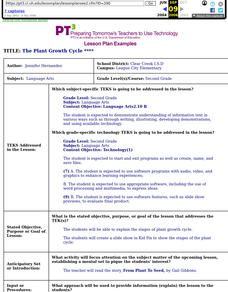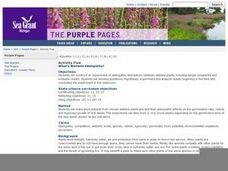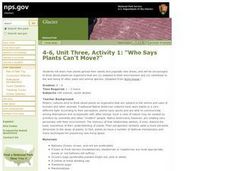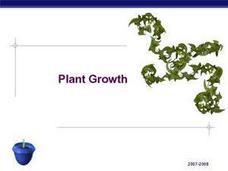Curated OER
Plant Reproduction
In this plant reproduction worksheet, students follow the steps to complete a science investigation and then respond to 2 short answer questions and complete a data table regarding the investigation.
Curated OER
Charting the Growth of the Milkweed Plant
In this charting the growth of the milkweed plant worksheet, students use the data given to complete the growth chart, then answer 5 questions about the information in the chart.
Curated OER
The Plant Growth Cycle
Students explain the stages of the plant growth cycle, and create a slide show to chart the stages of growth.
Curated OER
Parts of the Plants that we Eat
First graders study plants and their parts to see what parts are edible. In this plant lesson students are assigned plant parts and they are to put them in the right category.
Curated OER
What's Wetland Allelopathy?
Students study plants and what they need to thrive and survive. They make plant extracts from chosen wetland plants and test their allelopathic effects on the germination rate, radicle growth, and hypocotyl growth of test seeds of other...
Curated OER
Will It Grow?
Fifth graders conduct experiments involving plants. In this science lesson, 5th graders design an experiment involving plants. Students use the scientific method to design their experiments.
Curated OER
Stator limbatus Study, Part 1
Second graders experiment identifying beetle emergence and exit holes in seeds, count them, look for beetle eggs with a magnifier and count how many beetle eggs they find. They then graph on a data sheet the findings from their research.
Curated OER
Do They Grow Up or Down?
Young scholars keep a garden journal after planting a garden and discuss environmental stresses put upon the garden for growth. In this garden lesson plan, students plant the plants differently from one another and observe the outcomes.
Curated OER
Edible and Medicinal Plants: Field Trip Guide
Though it's designed to guide a field trip to the New York Botanical Garden, you could take resource like this one to a local park, wilderness area, school garden, or even a weedy empty lot. Middle schoolers identify plant parts and...
Curated OER
Who Says Plants Can't Move?
Students discover how plants spread their seeds using other plants and animals. In this plant instructional activity, students role play different plants and how their seeds travel. Students then have a class discussion to ensure their...
Curated OER
Native Beauty
Young scholars plant wild flowers and maintain their garden. In this wild flowers lesson plan, students pick and prepare a gardening site, plant wild flowers, and maintain it everyday.
Curated OER
Ready for Roots
Fourth graders sort seeds and predict what conditions are needed for them to germinate. They keep the seeds moist, observe and measure their growth and graph the results. As the seeds start to grow students compare and contrast the each...
Curated OER
Garden In a Glove
Pupils investigate the concept of seeds and how they can germinate. They obtain seeds and isolate them in a rubber glove before transplanting them into the ground. The lesson includes a graphic organizer for observations or information.
Curated OER
Bee Pollen Popular
The world would be a much different place without the help of pollinators. Read about the important role bats, hummingbirds, and various insects play in plant reproduction, exploring the interdependence of living things in an ecosystem....
Curated OER
Why Does the Cocoa Tree Need a Tropical Rainforest to Grow?
Fourth graders explore the requirements a cocoa plant needs to survive. They research where chocolate comes from and how humans can affect the growth of cocoa trees. Students create a 3-D model of a cocoa tree and compare and contrast...
Curated OER
Prairie In A Bottle
Second graders observe images of prairie ecosystems and discuss the needs of living things. They create a prairie habitat in a closed jar to observe the water cycle and plant growth.
Curated OER
Plants
Explore plant biology with your primary learners through this simple presentation. Each slide contains basic facts about plant survival elements such as nutrients, water, warmth, and sunlight. The colorful illustrations will engage your...
Curated OER
Plant Growth
Examine the growth regions and tissues in plants. The structures and specialized areas of roots, stems, and shoots are defined and supported with diagrams and pictures. Your class will also learn the details of specific growth...
Curated OER
"Lettuce" Learn About the Water Cycle
Young scientists investigate the water cycle through a lettuce seed experiment. For this experiment, learners plant lettuce seeds inside of a ziplock bag in order to create a small greenhouse. They observe condensation and precipitation,...
Curated OER
The Peanut Wizard
Students read and discuss information regarding George Washington Carver and how the peanut became cultivated in the southern colonies of the United States. In this George Washington Carver lesson, students develop vocabulary that...
Captain Planet Foundation
Fall into Healthy Shapes
Kindergartners identify geometric shapes by planting a fall garden. They start their seeds in containers that have different shapes, and keep track of their plants based on those shapes. This brilliantly designed and incredibly thorough...
Scholastic
Study Jams! Flowers
RJ hangs out in Zoe's garden as she explains pollination, flower anatomy, and fertilization. This cartoon-styled feature is sure to stay in your botanists' minds! Follow it with the dissection of large flowers, such as the lily.
Curated OER
Two Beets Or Not Two Beets—What Is Your Question?
Students use the scientific method to test an idea regarding the structures of a plant as it supports the biological evidence for life. In this growing roots lesson, students use organizing sheets to record their findings. Students...
National Christmas Tree Association
Merry Christmas, Geraldine
If you're reading the story "Merry Christmas, Geraldine" by Holly Keller, this is a fantastic cross-curricular resource to use. Complete with activities for language arts, science, social studies, art, and math, you'll get the most out...

























